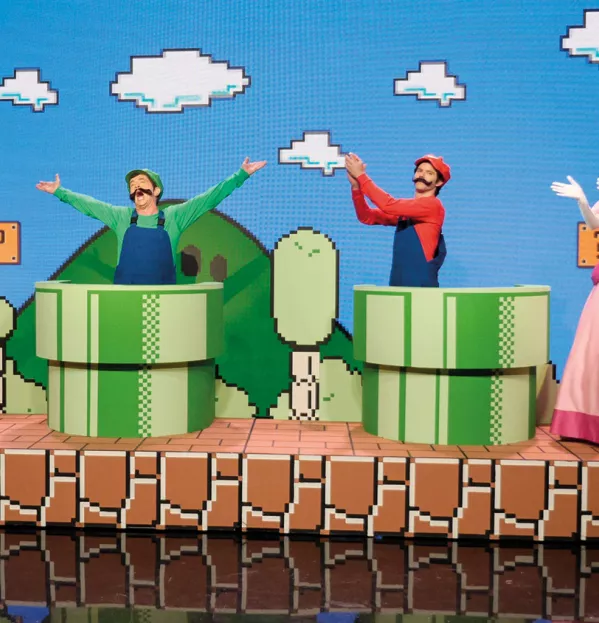Mini rewards a treat for Super Mario and students

I hadn’t thought about video game hero Super Mario for years, except for a brief period when a group of Year 9s decided I resembled him. Over the last year though, the ubiquitous and delightful cultural nostalgia for the 1980s got me itching to track down a NES console and relive the princess-rescuing adventures of the plumber. When I found out you could download these old games on modern consoles, that was it; I lost a half-term holiday to Super Mario Bros. 3.
As a teacher of GCSE English resits and (it sometimes feels like) the policy’s lone cheerleader, I have to find a way to approach something that is often unhelpfully described as “a cycle of failure”. Playing Super Mario Bros. 3, I couldn’t help but start seeing parallels. I was very bad at the game.
I endlessly mistimed jumps, made clumsy mistakes, and invariably failed to remember the obstacle that had already killed me 20… 30…40 times. Yet I was having an absolute blast, grinning foolishly, humming along to melodies buried in my grey matter for three decades and howling with hilarity as I fell off the bottom of the screen yet again.
This isn’t only true of Super Mario and video games, but also pretty much every area outside of the classroom, whether it is timing a difficult guitar-chord transition, or perfecting a soufflé. All involve a number of unsuccessful attempts before the practice pays off, but it’s only in education that we manage to give young people hang ups about perceived “failure”.
One of the things the Super Mario games do so well is to plant mini rewards throughout each level that add to excitement and sense of achievement, regardless of whether you pass the level or not. From mushrooms and invincibility stars to the raccoon leaf, they provide “power ups” that give the player a boost.
The obvious classroom parallel is praise. I can’t imagine that many teachers don’t utilise this at all, but to do praise well, you do have to be strategic and genuine. Undeserved praise not only does nothing for the individual but is also likely to irritate the other students. It’s far better to be sparing with praise, but when a student does something genuinely praiseworthy, go klaxons-blaring, fireworks-blazing, superlatives-overspilling crazy.
You will have been told already to be specific with your praise, but that’s not entirely correct: praise something that you could be specific about, but don’t be. Then choose a student to explain why you’re dancing around with excitement. That way, you amplify the effect of the praise by making another student repeat it, plus you put that other student on the first step of the road to evaluation.
It’s a kind of Magic
How you feel about bribery will depend on whether you’ve been in teaching long enough for your opinion of it to have moved from undesirable to indispensable. (If you’re in the former camp, skip the next few paragraphs.)
Tangible rewards are most effective when you know your groups well and can tap into their idiosyncrasies. The most effective rewards are often those so far over the border into tragic that your teenage audience can get over themselves and buy into them.
For example, a group of disengaged “lads” in my class suddenly transformed into articulate rhetoricians at the opportunity of winning one of my old Magic: The Gathering cards, valuing a “Giant Spider” far more than the perplexed “nerds” across the room did. Similarly, a colleague elsewhere had put all of his childhood CD singles into a bin bag as a sort of lame lucky dip of Spice Girls solo hits.
Our students will often not want to be seen to care about something worth caring about, but once you remove that barrier you can tap into their unbridled, primal spirit of competition. It creates a community where achieving is equated with treasured, shared laughter.
Of course, the most powerful reward we can offer is usually contacting home. A phone call or an email is discreet and immediate. Your too-cool-for-school student returns home, is praised by a parent she pretends to despise but secretly worships and has a great weekend because of something she did in class.
More recently, I’ve discovered something called Super Mario Maker. It allows nostalgic thirtysomethings like myself to design our own online levels for the retro platform game. I seem to be much more successful at this than at actually playing the game.
Some of my levels that are “failed” 40 times for every one successful completion have been hugely popular. I like to think that this is because as a teacher I know where to dispense the little rewards that make you recognise your achievements even if you don’t pass the level - and that the level can be enough fun to make you want to keep trying until you do.
Andrew Otty is a curriculum leader for post-16 English in a South-West college
You need a Tes subscription to read this article
Subscribe now to read this article and get other subscriber-only content:
- Unlimited access to all Tes magazine content
- Exclusive subscriber-only stories
- Award-winning email newsletters
Already a subscriber? Log in
You need a subscription to read this article
Subscribe now to read this article and get other subscriber-only content, including:
- Unlimited access to all Tes magazine content
- Exclusive subscriber-only stories
- Award-winning email newsletters